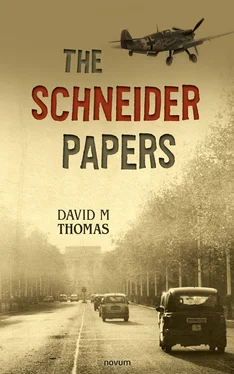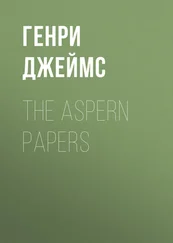Cartwright continued in that distinctive deep, resonant voice, ‘The afternoon was taken up with a run through a ‘us versus them’ exercise in terms of air power and machines capability. Logan has a tendency to overstate the obvious, I must agree. Your task, Mason, as Starling told you, was to find out what the Luftwaffe is planning and thinking in terms of future aircraft design and what they’ve already got.’ Cartwright clapped his left palm down on his knees. ‘Right, that was that.’
Mason did not answer, but sipped his whisky. He sensed there was more to come. Cartwright continued.
‘Did you notice anyone, shall I say, out of place at the meeting?’ Cartwright answered his own question. ‘It was the civilian who sat through the whole session and didn’t say a word, an observer,’ he emphasised. ‘Like me, a Foreign Office man, but unlike me, he quite admires Herr Hitler,’ he said quietly.
‘Shall I begin at the beginning? Before I do, let’s both have a top-up.’ He got up from the chair, took off his overcoat and laid it down next to Mason, and went for the bottle of whisky now on the little coffee table in front of the sofa. He poured a generous measure, like a father about to impart controversial or bad news to his son. He stared to pace, slowly, up and down the length of the room; as if the small steps he took were related to the information points he wanted to dissipate. Like a metronome.
He was tall, and walked with a slight stoop and a limp. War wound, guessed Mason.
‘We have to start in 1918, and the Armistice. The German generals had never fully accepted the principle of disarmament or the restrictions of the Versailles Treaty, which limited them to a small army with no tanks and no aeroplanes. This was supervised by the Allied Control Commission. So in the 1920s we had the bizarre situation of German pilots sent to Soviet Russia for training in air warfare.’
Harry Mason nodded, he knew about this business, and the Rapallo Treaty.
Cartwright talked as if he was conducting a tutorial, left thumb in his waistcoat pocket, the other hand holding his glass of whisky, and a tendency to whisk from his top pocket his reading glasses and swing them around to make a point or to compliment a feeling expressed, then stow them back in the pocket.
‘In 1926, when Germany applied for admission to the League of Nations, they also asked for the abolition of the Allied Control Commission. ‘The Allies,’ Cartwright stopped, and pointed his whisky glass at Mason, ‘through a thought process unbeknown to us mortals, agreed.
‘Now the gloves were off. The financial demands of the Generals were insatiable, especially with Paul Ludwig Hans Anton von Beneckendorff von Hindenburg, ex-Chief of the General Staff and now President of Germany, in control.
‘If Germany was to evade the restrictions of the Versailles Treaty, which it was determined to do, then, concluded Hindenburg, it had to be done openly, but cleverly.’ Cartwright bowed, holding the whisky glass up above his head, ‘May I introduce the pocket battleship Deutschland, laid down in ’29, launched in ‘31. Followed by the Admiral Graf Spee in ’34.’
Cartwright, was now getting into his stride.
‘The Treaty did permit Germany to build warships, but only up to ten thousand tons displacement, and guess what they did? The cunning Reichsmarine, as it was then called, devised a plan to equip armoured cruisers with eleven-inch guns, thus creating a ship which, according to its advocates, could outrun anything that could defeat it, and defeat anything that could overtake it. Even when Germany went through one financial crisis after another, the pocket battleship budget was protected. Now, of course, we can forget the ten thousand tons displacement limit; I refer you to the new Hiller Class heavy cruiser.’
Both took another sip of Springbank. ‘You’ve been pretty well brought up to speed on our assessement of the Luftwaffe, albeit we do have serious gaps in intelligence. Do you know how much Germany is now helping Franco in Spain?’
Mason said nothing.
‘It was dubbed Unternehmen Feuerzauber, Operation Magic Fire. Purely a transport and training mission, I’m told. The planes, Junkers Ju 52s transports and Heinkel He 51 bi-plane fighters, left Germany last month, through Italy and then across the Mediterranean to Spain. We were tipped off, and our man in Hamburg watched the ground crew, all in civilian clothes, shipped out down the Elbe, waving to well-wishers under the auspices of a Kraft durch Freude – Strength through Joy, the German Government Tourist Agency. An innocent tourist trip. About eighty of them, pilots, mechanics and ground crew. We’re trying to find out where they are right now.
‘What the future holds for Spain, and its possible domino effect in the rest of Europe, we can only guess, and plan for the worst. That is why the Royal Air Force is all in a tizzy.
‘Now let’s move closer to the real objective of your trip to Berlin.’ Cartwright shifted in his seat, make himself more comfortable. He looked at his wrist watch before continuing. ‘It’s getting dark. Don’t put on the ceiling light.’
‘Now, let’s talk Hitler,’ and he shifted his weight in the armchair. ‘The Weimar Republic appeared to have no idea how to solve the problems of the depression. One economic crisis after another. Hitler, on the other hand, promised salvation. He promised to make Germany proud again – it was exactly what people wanted to hear. He promised jobs, the rebuilding of infrastructure, and stability. Music to the ears of the whole spectrum of German society, from major industrialists to the lowly unemployed, and especially the military. The saviour has arrived – Der Führer.
‘So you see how it all comes together; the dissatisfied, the lowly paid working class, the six million on the bread-line unemployed, and the rich industrialists who crave for business and economic stability. Herr Hitler was in the right place at the right time. Cleverness, cunning, and luck all played a part for him to seize, and that is exactly what he did, the Chancellorship three years ago, in 1933. You now have to understand Mason, the state of this country. Those of us who appreciate the situation are fighting a war already, and against two opposing, and differently motivated, factions.
‘There are individuals who sincerely believe that war with Hitler would be a mistake. They are the ones who remember the last war, and don’t want to see that suffering and destruction ever again, at whatever cost. At whatever cost. Unfortunately, blinkered and dangerous thinking. And then, we have the other category, the real sympathisers with the creed of National Socialism; the antisemitic, anti-Bolshevik believers in a strong totalitarian government that is not hindered by a misguided democratic process – oh, yes! Believe me Mason, I know them, we are members of the same clubs. You should listen to their views on the General Strike of 1926. Workers should not be given ideas and most certainly not express views, or use our democratic system to promote such obvious communist ideology. Herr Hitler and his National Socialist policies strike a chord with a particular type of person. They are small in number, but, unfortunately, are in the right place to influence and hamper practical Government thinking and policy. We know of particular Nazi sympathisers in the Foreign Office, the aristocracy, Parliament, and industry. It therefore follows that there are other like-minded individuals out there,’ and he waved his arm towards the window, ‘whom we don’t know who they are, and therefore, where they are.’
Cartwright paused. ‘Well actually, there is a third category. They’re the ones who want Germany and Russia go to war. Fight each other, and leave us liberal democratic countries in peace.’ He shook his head. ‘What a blinkered, unreal world some people live in.’
Читать дальше












